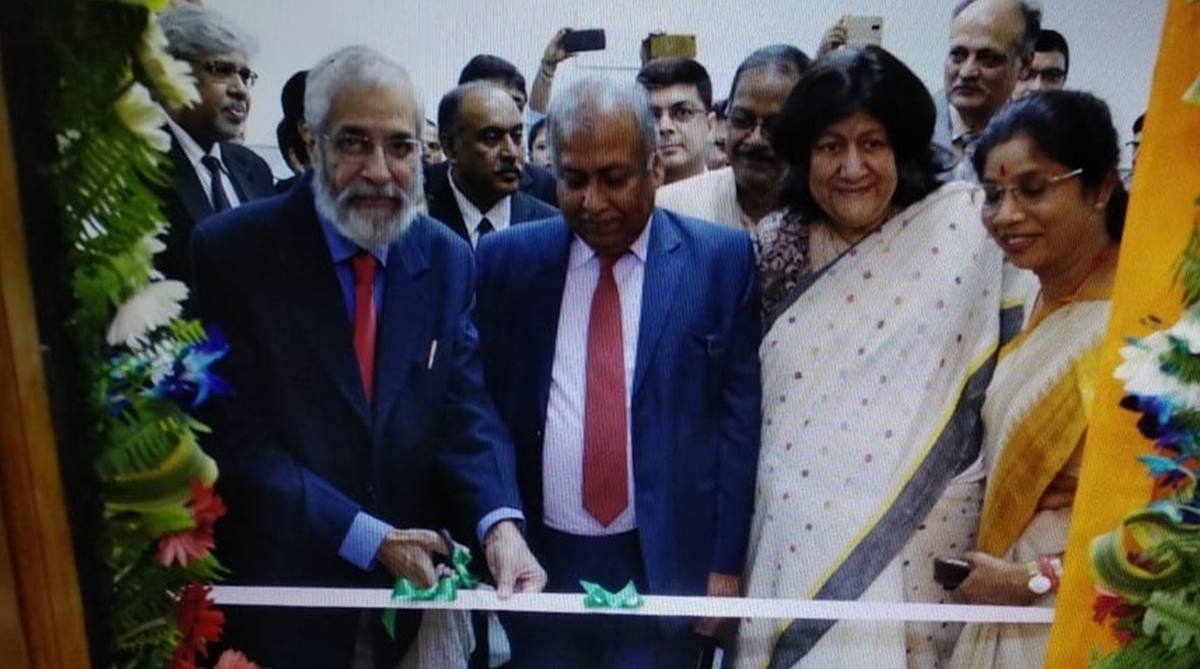Will knock the door of SC if rights of Himachal Pradesh not given by the Centre: CM
Chief Minister Sukhwinder Singh Sukhu has said that he will meet the Union Ministers to release the aid to Himachal under the Post Disaster Need Assessment (PDNA).
In a CFC, a juvenile victim is not made to face the accused directly unlike in a conventional court and is seated in a separate enclosure, from where the child interacts with the judge through video-conference, while the accused is produced in another enclosure.

Supreme Court Judge Justice Madan B Lokur, Chief Justice of the Calcutta High Court Jyotirmay Bhattacharya, Supreme Court Judge Justice Indira Banerjee and West Bengal cabinet Minister Shashi Panja during the inauguration of a child friendly court at Bichar Bhawan, in Kolkata on September 15, 2018. (Photo: IANS)
Four child friendly courts (CFC), aiming to create a congenial atmosphere for juveniles, were inaugurated in West Bengal on Saturday.
Children constitute 40 per cent of the country’s population and courts specifically catering to sensitivities and needs of children must be established, Supreme Court judge Justice Madan B Lokur said while inaugurating the state’s first CFC at Bankshall Court.
Advertisement
“The number of juvenile offenders in the country is about 30,000,” Justice Lokur said, adding: “But the juveniles against whom crimes have been committed is 90,000,” he pointed out.
Advertisement
All efforts must be made to give the children a good life, Justice Lokur said.
Referring to the alleged rape of 34 children at a shelter home in Bihar’s Muzaffarpur, he said: “Some of these girls didn’t even know that they were raped and there may be many more victims than those who have been identified.”
Similar incidents occurred at a children’s home in Deoria, Uttar Pradesh, Justice Lokur said. “A three-year old victim doesn’t even know what is rape and trial of such cases in a traditional manner is not possible as the children cannot express themselves owing to the legal language, procedures and the surrounding atmosphere,” he said.
The CFCs will be effective to fill this void, Justice Lokur said. Assistance of professionals like counsellors, psychologists, psychiatricts and other such specialists were needed to interact with children so that they could speak about what they had gone through, he said.
Justice Lokur, who conceptualised CFCs in the country, said setting up of such courts was a recognition of child rights. Three other CFCs ~ one each in Burdwan (east) district headquarters, Bankura district headquarters and Khatra ~ were also inaugurated.
Supreme Court judge Justice Indira Banerjee said that the concept was to create a court which is humane and considerate. “The objective is to rehabilitate. The CFCs are required to be empathetic to juvenile victims and deviants,” she said.
In a CFC, a juvenile victim is not made to face the accused directly unlike in a conventional court and is seated in a separate enclosure, from where the child interacts with the judge through video-conference, while the accused is produced in another enclosure.
A separate waiting room for children has been arranged, adjacent to the court rooms, where a television, toys and story books have been kept for them and they would be assisted by a counsellor.
Chief Justice of the Calcutta High Court Jyotirmoy Bhattacharya said: “Even after 71 years of independence, we cannot protect our children.”
Children are so traumatised in case of incidents of sexual assaults that they cannot narrate the incidents even to their parents and child friendly courts would remove these difficulties of juvenile victims, he said.
Advertisement